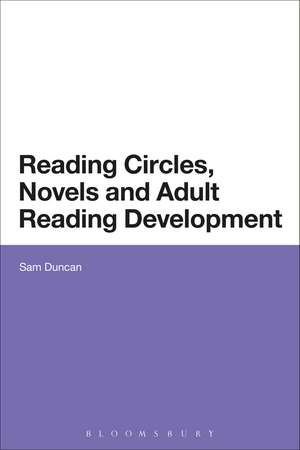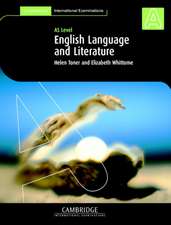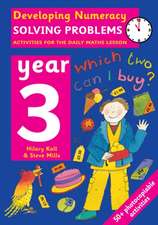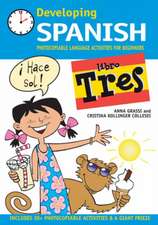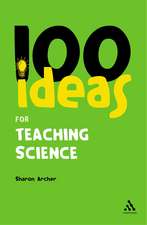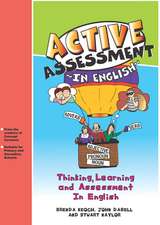Reading Circles, Novels and Adult Reading Development
Autor Dr Sam Duncanen Limba Engleză Paperback – 6 noi 2013
Toate formatele și edițiile
| Toate formatele și edițiile | Preț | Express |
|---|---|---|
| Paperback (1) | 257.03 lei 6-8 săpt. | |
| Bloomsbury Publishing – 6 noi 2013 | 257.03 lei 6-8 săpt. | |
| Hardback (1) | 890.28 lei 6-8 săpt. | |
| Bloomsbury Publishing – 22 feb 2012 | 890.28 lei 6-8 săpt. |
Preț: 257.03 lei
Preț vechi: 330.94 lei
-22% Nou
Puncte Express: 386
Preț estimativ în valută:
49.18€ • 51.63$ • 40.82£
49.18€ • 51.63$ • 40.82£
Carte tipărită la comandă
Livrare economică 10-24 aprilie
Preluare comenzi: 021 569.72.76
Specificații
ISBN-13: 9781472530141
ISBN-10: 1472530144
Pagini: 240
Ilustrații: 6 illus
Dimensiuni: 156 x 234 x 13 mm
Greutate: 0.34 kg
Editura: Bloomsbury Publishing
Colecția Bloomsbury Academic
Locul publicării:London, United Kingdom
ISBN-10: 1472530144
Pagini: 240
Ilustrații: 6 illus
Dimensiuni: 156 x 234 x 13 mm
Greutate: 0.34 kg
Editura: Bloomsbury Publishing
Colecția Bloomsbury Academic
Locul publicării:London, United Kingdom
Caracteristici
Offers insights into novel reading relevant to all readers, regardless of confidence, ability or experience.
Notă biografică
Sam Duncan is Lecturer in Education in the Department of Lifelong and Comparative Education at IOE, UCL's Faculty of Education and Society, University College London, UK. She has previously taught adult literacy, English as a foreign language and poetry, film and drama on adult return to study programmes.
Cuprins
Introduction1. The Charted Waters of Reading: How Reading is Claimed, Researched and Defined by Different Fields2. Reading and Adult Life3. How We Learnt to Read4. Literature and Literacy Development5. Reading Circles6. Researching a Reading Circle: What We Did7. Researching a Reading Circle: What We Found8. Reading as Experience9. Reading Circles as 'Ideal Pedagogy'10. The Individual and the Communal11. The Pleasures and Politics of Novel Reading and Reading CirclesConclusionIndex
Recenzii
This lively and engaged book invites us to look at reading in a different way, moving us beyond the tired old divisions between literacy and literature that have so bedevilled adult education. In doing so, it offers a new take on the idea of reading for pleasure, gathering up the dimensions of reading that are an indispensable part of all acts of reading: cognitive, imaginative, affective, educational and communicative. It includes a useful overview of the wide range of theoretical approaches to reading and challenges the idea that some kinds of reading are "functional" whereas others are "frivolous and non-essential". Writtenby an adult literacy expert, it suggests that reading researchers need to talk to readers themselves about their experiences and ideas about reading. It goeson to present the many insights that resulted from asking emerging adult readers the question "What does reading mean to you?" It also details the long and fascinating history of reading circles and advocates them as a potential pedagogy for adult literacy - a pedagogy that builds on a common reading practice, and which combines the pleasures and politics of novel reading with the sensibilities of adult literacy teaching.
An original, wide-ranging and thoughtful account of a phenomenon that is rarely researched. Sam Duncan provides a clear account of her research embedded within a scholarly account of the social history of reading that will be of interest to teachers of adult literacy, students of reading, researchers, teachers and those with a general interest in the culture of reading in the 21st Century. The strength of this book is the clarity of its writing and the accessibility of the discussion, as well as its scholarly reach. The imaginative space of the reader is evoked through original research into adult literacy students who love to read. Duncan's argument that an historical understanding of adult literacy and of reading can broaden what it is to read and to write is vital in broadening our understanding of contemporary readinghabits... The book also argues for the importance of reading for pleasure for all adults. As Duncan argues, "literacy is at once functional and metaphysical, individual and communal, transformative and transfiguring." This vision for the potential of literacy can help us re-consider the sometimes utilitarian accounts of literacy presented in schools and college settings and instead offer a vision for literacy that is concerned with transformation and social empowerment.
This book is well-written and engaging. Most importantly, it addresses reading circles, an area of adult literacy about which we know little. Hopefully it will stimulate additional interest in the area.
Adults just starting on their reading journey have so much to tell researchers and tutors. This thoughtful book captures their insights and puts the vital link between adult literacy learning and reading group activity in a rich historical context.
An original, wide-ranging and thoughtful account of a phenomenon that is rarely researched. Sam Duncan provides a clear account of her research embedded within a scholarly account of the social history of reading that will be of interest to teachers of adult literacy, students of reading, researchers, teachers and those with a general interest in the culture of reading in the 21st Century. The strength of this book is the clarity of its writing and the accessibility of the discussion, as well as its scholarly reach. The imaginative space of the reader is evoked through original research into adult literacy students who love to read. Duncan's argument that an historical understanding of adult literacy and of reading can broaden what it is to read and to write is vital in broadening our understanding of contemporary readinghabits... The book also argues for the importance of reading for pleasure for all adults. As Duncan argues, "literacy is at once functional and metaphysical, individual and communal, transformative and transfiguring." This vision for the potential of literacy can help us re-consider the sometimes utilitarian accounts of literacy presented in schools and college settings and instead offer a vision for literacy that is concerned with transformation and social empowerment.
This book is well-written and engaging. Most importantly, it addresses reading circles, an area of adult literacy about which we know little. Hopefully it will stimulate additional interest in the area.
Adults just starting on their reading journey have so much to tell researchers and tutors. This thoughtful book captures their insights and puts the vital link between adult literacy learning and reading group activity in a rich historical context.
